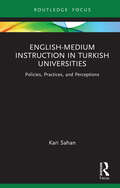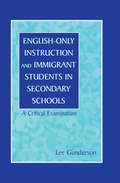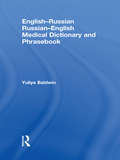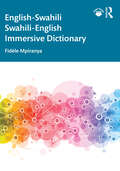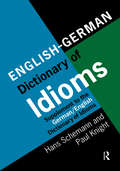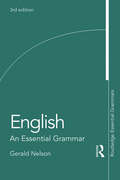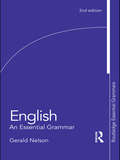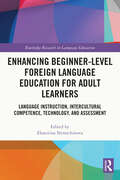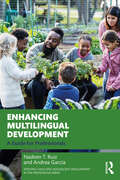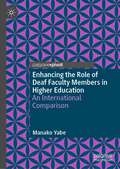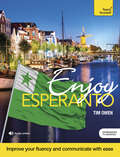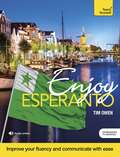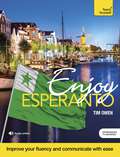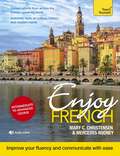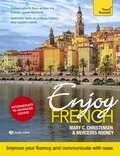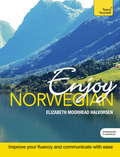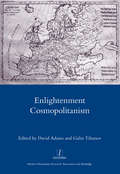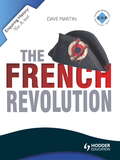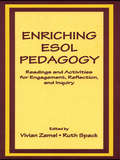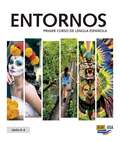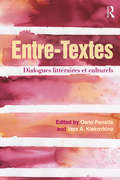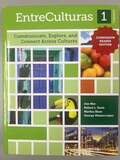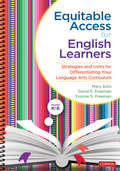- Table View
- List View
English-Medium Instruction in Turkish Universities: Policies, Practices, and Perceptions (Routledge Focus on English-Medium Instruction in Higher Education)
by Kari SahanIn response to the growing use of English as an international language, the number of English-medium instruction (EMI) programs in higher education has increased. However, decisions to implement EMI programs are often made through top-down policymaking processes with little consideration for the educational issues surrounding language policy changes.This book examines the variation with which EMI is implemented at universities in Turkey through a multilevel empirical investigation of policies, practices, and perceptions. In addition to providing a sociohistorical overview of EMI in Turkey, the book draws on a dataset that includes policy documents, classroom observations, interviews with teachers, and focus group discussions with students. Despite national policies which envision a "one-language-at-a-time" model of EMI education, this book argues that EMI is neither English-only nor English-always in practice. By highlighting the variation with which EMI is implemented at and across Turkish universities, this study illustrates the need for more comprehensive EMI policies and processes aimed at integrating content and language learning in higher education.Implications are discussed with respect to policy planning, program development, and pedagogical support and will be relevant for researchers and postgraduate research students interested in EMI, particularly in the Turkish context.
English-Only Instruction and Immigrant Students in Secondary Schools: A Critical Examination
by Lee GundersonThis book is for teachers, teacher educators, school and district administrators, policy makers, and researchers who want to know about literacy, cultural diversity, and students who speak little or no English. It offers a rich picture of the incredible diversity of students who enter secondary school as immigrants—their abilities, their needs, and their aspirations. The studies reported are part of a large longitudinal study of about 25,000 immigrant students in a district in which the policy is English-only instruction. These studies:*provide multiple views of the students’ lives and their success in schools where the language of instruction differs from the languages they speak with their friends and families;*explore the students’ views of teaching and learning; *describe the potential differences between the students views and those of their teachers; *look at issues related to students’ views of their identities as they work, study, and socialize in a new environment; and*examine different reading models designed to facilitate the learning of English as a second language (ESL). Educators and researchers will find the descriptions of students’ simultaneous learning of English and of academic content relevant to their view of whether instruction should be English only or bilingual. For teachers who view multicultural education as an important endeavor, this book may on occasion surprise them and at other times confirm their views. The author does not attempt to develop a particular political viewpoint about which approach works best with immigrant students. Rather, the objective of the studies was to develop a full, rich description of the lives of immigrant high school students enrolled in classes where the medium of instruction is English. The reader is left to evaluate the results.
English-Russian Russian-English Medical Dictionary and Phrasebook
by Yuliya BaldwinFirst Published in 2012. Routledge is an imprint of Taylor & Francis, an informa company.
English-Swahili Swahili-English Immersive Dictionary
by Fidèle MpiranyaOrganized in an English-Swahili section and a Swahili-English section, English-Swahili Swahili-English Immersive Dictionary is a comprehensive presentation of Swahili usual lexicon. In both sections, entries are presented in clusters, based on the connections between the words of the target language (Swahili) in terms of meaning or origin. This meaning-driven presentation allows target language terms that are relatively similar in meaning, and therefore easily confused, as well as terms derived from the same base, to appear together in parallel contrastive lines. This creates an immersion effect that is particularly stimulating for language learning, since the user gets the opportunity to discover the words of the learned language group-by-group, rather than one-by-one, and is constantly reminded of subtle differences between different terms. It will help the learner master the vocabulary at a faster pace and with a better understanding of the rules that shape the lexicon of the target language. In addition, the introduction to the dictionary presents key grammatical points of Swahili that will help the reader make a productive use of information provided in the body of the dictionary. Additional grammatical information about the target language words such as the agreement pattern, the register of speech, or the level of use, is also provided in both sections to make it immediately accessible to the non-native user. The book is ideal for English-speaking learners of Swahili.
English/German Dictionary of Idioms: Supplement to the German/English Dictionary of Idioms
by Professor Hans SchemannThis dictionary is the ideal supplement to the German/English Dictionary of Idioms, which together give a rich source of material for the translator from and into each language. The dictionary contains 15,000 headwords, each entry supplying the German equivalents, variants, contexts and the degree of currency/rarity of the idiomatic expression. This dictionary will be an invaluable resource for students and professional literary translators.Not for sale in Germany, Austria or Switzerland
English: An Essential Grammar (Routledge Essential Grammars #G29)
by Gerald NelsonEnglish: An Essential Grammar is written specifically for native speakers, beginning with the basics and going on to deal with phrase, clause and sentence structure, word formation and spelling. This fully revised third edition features new material on: the structure of phrases and clauses light verbs nominal adjectives the Operator preposition to and infinitival to the four thats determiners, prepositions, and common errors With new exercises and answers for all new sections, this Essential Grammar continues to be the ideal reference for anyone who would like to improve their knowledge of English grammar.
English: An Essential Grammar (Routledge Essential Grammars)
by Gerald NelsonEnglish: An Essential Grammar is a concise and user-friendly guide to the grammar of modern English, written specifically for native speakers and based on genuine samples of contemporary spoken and written English. In the first four chapters, this book covers the essentials of English grammar, beginning with the basics and going on to deal with phrase, clause and sentence structure. A fifth chapter deals with English word formation and spelling, including problem spellings and British and American spelling variants. Features include: discussion of points that often cause problems guidance on sentence building and composition practical spelling guidelines explanation of grammatical terms a set of exercises at the end of each chapter appendix of irregular verbs. With numerous language examples bringing grammar to life, this Essential Grammar will help you read, speak and write English with greater confidence. It is ideal for everyone who would like to improve their knowledge of English grammar. Gerald Nelson is Professor in the English Department at The Chinese University of Hong Kong, and formerly Reader in the Department of English Language and Literature, University College London, UK.
Enhancing Beginner-Level Foreign Language Education for Adult Learners: Language Instruction, Intercultural Competence, Technology, and Assessment (Routledge Research in Language Education)
by Ekaterina NemtchinovaThis book is an authoritative text that explores best classroom practices for engaging adult learners in beginner-level foreign language courses. Built around a diverse range of international research studies and conceptual articles, the book covers four key issues in teaching language to novice students: development of linguistic skills; communicative, and intercultural competence; evaluation and assessment; and the use of technology. Each chapter includes teaching insights that are supported by critical research and can be practically applied across languages to enhance instructional strategies and curriculum designs. The text also aims to build intercultural competence, harness technology, and design assessment to stimulate effective learning in formal instructional settings including colleges, universities, and specialist language schools. With its broad coverage of language pedagogy at the novice level, this book is a must read for graduate students, scholars, researchers, and practitioners in the fields of language education, second language acquisition, language teaching and learning, and applied linguistics.
Enhancing Multilingual Development: A Guide for Professionals (Applying Child and Adolescent Development in the Professions Series)
by Nadeen T. Ruiz Andrea GarcíaThis accessible volume presents an up-to-date overview of how young children, older youth, and adults develop multilingual proficiencies. Importantly, it highlights an assets view of multilingualism, offering clear recognition that multilingual competencies are both functional and highly valued in communities across the globe.Dispelling common myths, it explores the benefits of multilingualism spanning interpersonal, academic, and professional settings. With these settings in mind, the book provides practical information on how professionals can promote effective communication with colleagues and clients from a variety of language backgrounds. Each chapter comes equipped with a series of true or false statements where you can record your predictions and learn as you read. Chapters cover topics including the economic and cognitive benefits of multilingualism, social influences, the age factor, family bilingualism and optimal teaching and learning conditions. Finally, the book concludes by providing various step-by-step resources for creating optimal conditions that further develop and support multilingualism in your professional field.Containing suggestions for research-based practices in home, school, and professional settings to enhance multilingual development, this book is essential for professionals working with multilingual young children, older youth, and adults, as well as those who require a foundational understanding of multilingualism.
Enhancing the Role of Deaf Faculty Members in Higher Education: An International Comparison
by Manako YabeThis book is based on an international, mixed methods research project that conducted interviews with 25 deaf or hard-of-hearing (DHH) faculty members from mainstream universities and 19 university students who took classes taught by DHH faculty members and collected surveys from 57 DHH faculty members and 104 university students worldwide. The author reports on their experiences of accessibility at their institutions and makes recommendations based on the findings. The book will serve as a user guide or supplemental text for DHH faculty members, researchers, students, and academic interpreters, as well as university administrators and disability service directors who are looking to improve disability provision at their institutions.
Enjoy Esperanto
by Tim OwenEnjoy Esperanto introduces you to the more advanced points of Esperanto grammar and develops your vocabulary through a variety of engaging and contemporary themes, giving you the skills you need to respond to a wide range of authentic texts and conversations.What will I achieve by the end of the course?By the end of Enjoy Esperanto you will have increased your capacity to understand the spoken and written language, and furthered your ability to communicate with Esperanto speakers, orally and in writing. This course aims to take you from a good intermediate level (B1/B2 on the Common European Framework of Reference for languages / Advanced Low of the ACTFL) and help you progress up to a C1 / Advanced High level. Is this course for me?If you already know some Esperanto and want to take it further, this is the course for you. It's perfect for the self-study learner, with a one-to-one tutor, or for the post-beginner classroom.What do I get?A coursebook with over two hours of audio online that features:- Ten units that cover more complex situations than your basic tourist scenarios- Carefully levelled and sequenced material - a solid path to build up your knowledge- Insight into Esperanto culture- Authentic texts, such as newspaper articles, blogs, poems, songs, excerpts and conversations to present the language- Learn through the Discovery Method which helps you notice patterns and retain the language you learn- Learn to learn - tips and advice on becoming a better language learner- Easy to use workbook format.What else can I use to learn Esperanto?If you want a comprehensive beginner to intermediate course, you should try our Complete Esperanto.Rely on Teach Yourself, trusted by language learners for over 80 years.
Enjoy Esperanto Intermediate to Upper Intermediate Course: Improve your fluency and communicate with ease
by Tim OwenEnjoy Esperanto introduces you to the more advanced points of Esperanto grammar and develops your vocabulary through a variety of engaging and contemporary themes, giving you the skills you need to respond to a wide range of authentic texts and conversations.What will I achieve by the end of the course?By the end of Enjoy Esperanto you will have increased your capacity to understand the spoken and written language, and furthered your ability to communicate with Esperanto speakers, orally and in writing. This course aims to take you from a good intermediate level (B1/B2 on the Common European Framework of Reference for languages / Advanced Low of the ACTFL) and help you progress up to a C1 / Advanced High level. Is this course for me?If you already know some Esperanto and want to take it further, this is the course for you. It's perfect for the self-study learner, with a one-to-one tutor, or for the post-beginner classroom.What do I get?A coursebook with over two hours of audio online that features:- Ten units that cover more complex situations than your basic tourist scenarios- Carefully levelled and sequenced material - a solid path to build up your knowledge- Insight into Esperanto culture- Authentic texts, such as newspaper articles, blogs, poems, songs, excerpts and conversations to present the language- Learn through the Discovery Method which helps you notice patterns and retain the language you learn- Learn to learn - tips and advice on becoming a better language learner- Easy to use workbook format.What else can I use to learn Esperanto?If you want a comprehensive beginner to intermediate course, you should try our Complete Esperanto.Rely on Teach Yourself, trusted by language learners for over 80 years.
Enjoy Esperanto Intermediate to Upper Intermediate Course: Improve your fluency and communicate with ease
by Tim OwenEnjoy Esperanto introduces you to the more advanced points of Esperanto grammar and develops your vocabulary through a variety of engaging and contemporary themes, giving you the skills you need to respond to a wide range of authentic texts and conversations.What will I achieve by the end of the course?By the end of Enjoy Esperanto you will have increased your capacity to understand the spoken and written language, and furthered your ability to communicate with Esperanto speakers, orally and in writing. This course aims to take you from a good intermediate level (B1/B2 on the Common European Framework of Reference for languages / Advanced Low of the ACTFL) and help you progress up to a C1 / Advanced High level. Is this course for me?If you already know some Esperanto and want to take it further, this is the course for you. It's perfect for the self-study learner, with a one-to-one tutor, or for the post-beginner classroom.What do I get?A coursebook with over two hours of audio online that features:- Ten units that cover more complex situations than your basic tourist scenarios- Carefully levelled and sequenced material - a solid path to build up your knowledge- Insight into Esperanto culture- Authentic texts, such as newspaper articles, blogs, poems, songs, excerpts and conversations to present the language- Learn through the Discovery Method which helps you notice patterns and retain the language you learn- Learn to learn - tips and advice on becoming a better language learner- Easy to use workbook format.What else can I use to learn Esperanto?If you want a comprehensive beginner to intermediate course, you should try our Complete Esperanto.Rely on Teach Yourself, trusted by language learners for over 80 years.
Enjoy French Intermediate to Upper Intermediate Course: Improve your fluency and communicate with ease
by Mary C. Christensen Mercedes RooneyDo you want to have more meaningful conversations in French? Do you want to feel comfortable in a variety of situations?Based on authentic texts, such as newspaper articles, blogs, songs, poems, and conversations between native speakers, this course will help you improve and build upon the language you already have so that you develop your skills to a level where you can enjoy communicating in French. Incorporating information about the culture, history and geography of France and French-speaking countries, you will be introduced to the more advanced points of French grammar, as well as more colloquial language, and develop your vocabulary so you can express your opinion on a number of topics, as well as react to other people's opinions.What will I achieve by the end of the course?By the end of Enjoy French you will have increased your capacity to understand the spoken and written language, and furthered your ability to communicate with French speakers, orally and in writing. This course aims to take you from a good intermediate level (B1/B2 on the Common European Framework of Reference for languages / Advanced Low of the ACTFL) and help you progress up to a C1 / Advanced High level. Is this course for me?If you already know some French and want to take it further, this is the course for you. It's perfect for the self-study learner, with a one-to-one tutor, or for the post-beginner classroom.What do I get?A coursebook with over two hours of audio online that features:- Ten units that cover more complex situations than your basic tourist scenarios- Carefully levelled and sequenced material - a solid path to build up your knowledge- Insight into both France and the French overseas territories - Authentic texts, such as newspaper articles, blogs, poems, songs, excerpts and conversations to present the language- Learn through the Discovery Method which helps you notice patterns and retain the language you learn- Learn to learn - tips and advice on becoming a better language learner- Easy to use workbook format.What else can I use to learn French?If you require an absolute beginner course, you can try our Get Started in French.If you want a comprehensive beginner to intermediate course, you should try our Complete French.Rely on Teach Yourself, trusted by language learners for over 75 years.
Enjoy French Intermediate to Upper Intermediate Course: Improve your fluency and communicate with ease
by Mary C. Christensen Mercedes RooneyDo you want to have more meaningful conversations in French? Do you want to feel comfortable in a variety of situations?Based on authentic texts, such as newspaper articles, blogs, songs, poems, and conversations between native speakers, this course will help you improve and build upon the language you already have so that you develop your skills to a level where you can enjoy communicating in French. Incorporating information about the culture, history and geography of France and French-speaking countries, you will be introduced to the more advanced points of French grammar, as well as more colloquial language, and develop your vocabulary so you can express your opinion on a number of topics, as well as react to other people's opinions.What will I achieve by the end of the course?By the end of Enjoy French you will have increased your capacity to understand the spoken and written language, and furthered your ability to communicate with French speakers, orally and in writing. This course aims to take you from a good intermediate level (B1/B2 on the Common European Framework of Reference for languages / Advanced Low of the ACTFL) and help you progress up to a C1 / Advanced High level. Is this course for me?If you already know some French and want to take it further, this is the course for you. It's perfect for the self-study learner, with a one-to-one tutor, or for the post-beginner classroom.What do I get?A coursebook with over two hours of audio online that features:- Ten units that cover more complex situations than your basic tourist scenarios- Carefully levelled and sequenced material - a solid path to build up your knowledge- Insight into both France and the French overseas territories - Authentic texts, such as newspaper articles, blogs, poems, songs, excerpts and conversations to present the language- Learn through the Discovery Method which helps you notice patterns and retain the language you learn- Learn to learn - tips and advice on becoming a better language learner- Easy to use workbook format.What else can I use to learn French?If you require an absolute beginner course, you can try our Get Started in French.If you want a comprehensive beginner to intermediate course, you should try our Complete French.Rely on Teach Yourself, trusted by language learners for over 75 years.
Enjoy French Intermediate to Upper Intermediate Course: Improve your fluency and communicate with ease
by Mary C. Christensen Mercedes RooneyDo you want to have more meaningful conversations in French? Do you want to feel comfortable in a variety of situations? Based on authentic texts, such as songs, poems, and conversations between native speakers, this course will help you improve and build upon the language you already have so that you develop your skills to a level where you can enjoy communicating in French. Incorporating information about the culture, history and geography of France and French speaking countries, you will be introduced to the more advanced points of French grammar, as well as more colloquial language, and develop your vocabulary so you can express your opinion on a number of topics, as well as react to other people's opinions.What will I achieve by the end of the course?By the end of Enjoy French you will have increased your capacity to understand the spoken and written language, and furthered your ability to communicate with French speakers, orally and in writing. This course aims to take you from a good intermediate level (B1/B2 on the Common European Framework of Reference for languages / Advanced Low of the ACTFL) and help you progress up to a C1 / Advanced High level. Is this course for me? If you already know some French and want to take it further, this is the course for you. It's perfect for the self-study learner, with a one-to-one tutor, or for the post-beginner classroom.What do I get? A coursebook with over two hours of audio online that features: - Ten units that cover more complex situations than your basic tourist scenarios - Carefully levelled and sequenced material - a solid path to build up your knowledge - Authentic texts, such as poems, songs, excerpts and conversations to present the language - Learn through the Discovery Method which helps you notice patterns and retain the language you learn - Learn to learn - tips and advice on becoming a better language learner - Easy to use workbook format.What else can I use to learn French? If you require an absolute beginner course, you can try our Get Started in French. If you want a comprehensive beginner to intermediate course, you should try our Complete French.Rely on Teach Yourself, trusted by language learners for over 75 years.
Enjoy Norwegian Intermediate to Upper Intermediate Course: Enhanced Edition
by Elizabeth Moorhead Curtiss nee HalvorsenDo you want to have more meaningful conversations in Norwegian? Do you want to feel comfortable in a variety of situations?Based on authentic texts, such as songs, poems, and conversations between native speakers, this course will help you improve and build upon the language you already have so that you develop your skills to a level where you can enjoy communicating in Norwegian. You will be introduced to the more advanced points of Norwegian grammar, as well as more colloquial language, and develop your vocabulary so you can express your opinion on a number of topics, as well as react to other people's opinions.You will enjoy learning about the culture, history and geography of Norway and its influence on the language. What will I achieve by the end of the course?By the end of Enjoy Norwegian you will have increased your capacity to understand the spoken and written language, and furthered your ability to communicate with Norwegian speakers, orally and in writing.Is this course for me?If you already know some Norwegian and want to take it further, this is the course for you. It's perfect for the self-study learner, with a one-to-one tutor, or for the post-beginner classroom.What do I get?A coursebook with over two hours of audio on CD that features:- Ten units that cover more complex situations than your basic tourist scenarios- Carefully levelled and sequenced material - a solid path to build up your knowledge- Authentic texts, such as poems, songs, excerpts and conversations to present the language- Learn through the Discovery Method which helps you notice and retain the language you learn- Learn to learn - tips and advice on becoming a better language learner - Easy to use workbook format This course will take you from a good intermediate level (Level B2 of the Common European Framework / Advanced Low of the ACTFL) and help you progress up to C1 / Advanced High.What else can I use to learn Norwegian?If you require an absolute Beginner course, you can try our Get Started in Norwegian: 9781473612709If you want a comprehensive Beginner to Intermediate course, you should try our Complete Norwegian: 9781444195040Rely on Teach Yourself, trusted by language learners for over 75 years.
Enlightenment Cosmopolitanism
by David AdamsEnlightenment Cosmopolitanism brings together ten innovative contributions by outstanding scholars working across a wide array of disciplines in the humanities and social sciences. Interdisciplinary in its methodology and compass, with a strong comparative European dimension, the volume examines discourses ranging from literature, historiography, music and opera to anthropology and political philosophy. It makes an original contribution to the study of 18th-century ideas of universal peace, progress and wealth as the foundation of future debates on cosmopolitanism. At the same time, it analyses examples of counter-reaction to these ideas and discusses the relevance of the Enlightenment for subsequent polemics on cosmopolitanism, including 21st-century debates in sociology, politics and legal theory.
Enquiring History: The French Revolution
by Dave MartinThink more deeply and work more independently at A level History through a carefully thought-out enquiry approach from SHP.Enquiring History: It makes you think! The OFSTED report on school history suggests that the current generation of A Level students have been poorly served by exam-based textbooks which spoon-feed students while failing to enthuse them or develop deeper understandings of studying HistoryThe Schools History Project has risen to this challenge with a new series for the next generation. Enquiring History is SHP's fresh approach to Advanced Level History that aims: - To motivate and engage readers - To help readers think and gain independence as learners- To encourage enquiry, and deeper understanding of periods and the people of the past- To engage with current scholarship - To prepare A Level students for universityKey features of each Student book- Clear compelling narrative - books are designed to be read cover to cover- Structured enquiries - that explore the core content and issues of each period- 'Insight' panels between enquiries provide context, overview, and extension - Full colour illustrations throughoutWeb-based support includes- lesson planning tools and activities for teachers- Dynamic eBooks for whole class teaching or individual student reading- Exam advice for each specification The French RevolutionThis title covers the turbulent history of France from 1774 to 1802 and the revolutionary events and larger than life individuals whose ideas and actions sent shock waves around Europe. Each enquiry tackles a discrete topic which together build a rounded and balanced picture of the causes, the course, the consequences, and the historiography of the revolution. As William Doyle puts it: 'There are few periods in history when so many benevolent intentions led to such unintended chaos and destruction, ...'How and why did this happen? What can we learn from it? What has the French Revolution got to say to us today?Web-based support includes- lesson planning tools and guidance for teachers available from the SHP website http://www.schoolshistoryproject.org.uk/Publishing/BooksSHP- eBooks for whole class teaching or individual student reading available from eBook retailers
Enriching Esol Pedagogy: Readings and Activities for Engagement, Reflection, and Inquiry
by Ruth Spack Vivian ZamelEnriching ESOL Pedagogy: Readings and Activities for Engagement, Reflection, and Inquiry is a collection of thought-provoking articles and activities designed to engage practicing and prospective ESOL teachers in an ongoing process of reflecting on, critically examining, and investigating theory and practice. Its twofold purpose is to provide a theoretical perspective and to offer ways for making the teaching of English to speakers of other languages (ESOL) meaningful for both teachers and learners. Underlying the activities and the readings themselves is the assumption that teachers need to play a role in exploring, shaping, and theorizing the work they do. The readings included represent a range of genres. They are informed by a common philosophical perspective about language acquisition and treat language teaching and learning holistically. The book is organized into five integrated units that: * raise questions about conventional notions of methods; * take into account the complicated nature of real classrooms; * provide theoretical principles for teaching that promotes language acquisition; * include rich descriptions of actual classroom experiences; and * question assumptions about language and literacy. Each set of readings begin with a "Before Reading" section and is followed by "Reflecting on the Readings," "Reading for Further Reflection," and "Suggested Projects for Inquiry" sections. This volume is a valuable resource for practicing and prospective teachers in the field of TESOL who work with diverse student populations--at all levels--in both mainstream and ESL/bilingual settings.
Entornos Units 0-4
by Celia MeanaEntornos, an introductory Spanish course, helps you develop the language you need to connect to real-world, practical issues. Entornos supports communicative, empowered learning. Inductive learning helps students deepen their understanding of language through discovery and inference. Real-life learning gives immersive, relatable scenarios, and provides a framework for communication. Learning strategies reinforce learning as students understand the processes and methods that work best for them. Social and emotional relevance increases students' motivation to learn a language, boosting acquisition and retention. Cultural and intercultural learning builds global awareness while developing authentic communication skills.
Entre-Textes: Dialogues littéraires et culturels
by Oana Panaïté Vera A. Klekovkina<p>Entre-Textes introduces advanced students of French to the richness of the Francophone world through literature from the Middle Ages to the 21st century. <p>The course anthology is divided into fourteen modules, each of which pairs a classical text with a modern one. Students are guided to read works from different periods of time and cultural origin and consider how these echo, complement or question each other. Through comparing and contrasting the texts, students will develop a new approach to reading literature while simultaneously reinforcing linguistic and cultural competencies. <p>Suitable for advanced students of French and featuring texts from across the French-speaking world, Entre-Textes is an innovative course anthology with a flexible structure and versatile methodology.</p>
EntreCulturas Espanol 1
by Ann Mar Robert L. Davis Maritza Sloan George Watson-LópezCOMMUNICATE, EXPLORE, AND CONNECT ACROSS CULTURES
Equitable Access for English Learners, Grades K-6: Strategies and Units for Differentiating Your Language Arts Curriculum
by Yvonne S. Freeman David E. Freeman Mary SotoPlain and simple: until our English learners have equitable access to the curriculum, they’ll continue to struggle with subject area content. And if you’re relying on add-on’s to fit in from your language arts basal or a supplementary program, Mary Soto, David Freeman, and Yvonne Freeman are here to equip you with much more effective, efficient, and engaging strategies for helping your English learners read and write at grade level. One assurance right from the start: Mary, David, and Yvonne are not suggesting you reinvent your curriculum. Instead, Equitable Access for English Learners, Grades K-6, focuses on how to fortify foundational practices already in place. First, you’ll learn more about the Equitable Access Approach, then it’s time to dive into the book’s four units of study. Drawing on each unit’s many strategies, you’ll discover how to apply them to any unit in your own language arts curriculum and start differentiating: How to draft and implement language objectives to help English learners meet academic content standards How to make instructional input comprehensible, including translanguaging strategies that draw on your students’ first languages when you don’t know how to speak them How to utilize the characteristics of text to support readers, along with a rubric for determining a text’s cultural relevance How to build students’ academic content knowledge and develop academic language proficiency Each unit addresses a commonly taught topic in today’s language arts programs and comes with ready-to-go review and preview activities, key strategies, grade-level adaptations, reflection exercises, and printable online resources. Taken as a whole, they constitute an all-new approach for providing that equitable and excellent access our English learners so rightfully deserve. "When you adopt our Equitable Access Approach, your students will not only thrive, they’ll also find your language arts curriculum much more meaningful and engaging." —Mary Soto, David E. Freeman, and Yvonne S. Freeman
Equitable Access for English Learners, Grades K-6: Strategies and Units for Differentiating Your Language Arts Curriculum
by Yvonne S. Freeman David E. Freeman Mary SotoPlain and simple: until our English learners have equitable access to the curriculum, they’ll continue to struggle with subject area content. And if you’re relying on add-on’s to fit in from your language arts basal or a supplementary program, Mary Soto, David Freeman, and Yvonne Freeman are here to equip you with much more effective, efficient, and engaging strategies for helping your English learners read and write at grade level. One assurance right from the start: Mary, David, and Yvonne are not suggesting you reinvent your curriculum. Instead, Equitable Access for English Learners, Grades K-6, focuses on how to fortify foundational practices already in place. First, you’ll learn more about the Equitable Access Approach, then it’s time to dive into the book’s four units of study. Drawing on each unit’s many strategies, you’ll discover how to apply them to any unit in your own language arts curriculum and start differentiating: How to draft and implement language objectives to help English learners meet academic content standards How to make instructional input comprehensible, including translanguaging strategies that draw on your students’ first languages when you don’t know how to speak them How to utilize the characteristics of text to support readers, along with a rubric for determining a text’s cultural relevance How to build students’ academic content knowledge and develop academic language proficiency Each unit addresses a commonly taught topic in today’s language arts programs and comes with ready-to-go review and preview activities, key strategies, grade-level adaptations, reflection exercises, and printable online resources. Taken as a whole, they constitute an all-new approach for providing that equitable and excellent access our English learners so rightfully deserve. "When you adopt our Equitable Access Approach, your students will not only thrive, they’ll also find your language arts curriculum much more meaningful and engaging." —Mary Soto, David E. Freeman, and Yvonne S. Freeman
